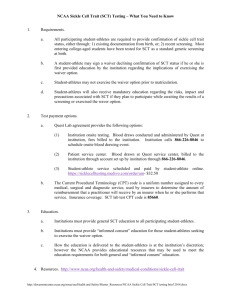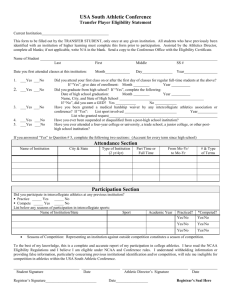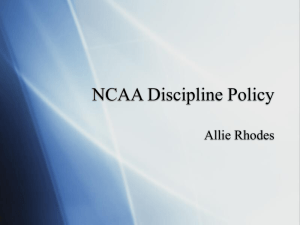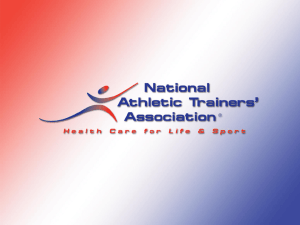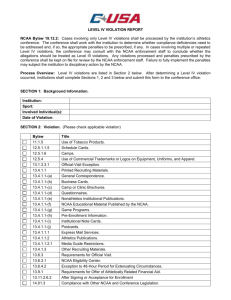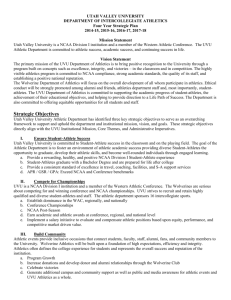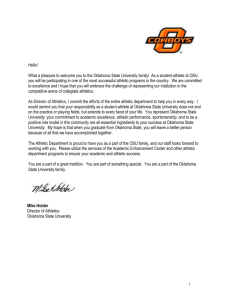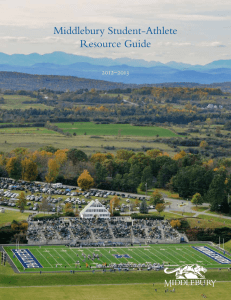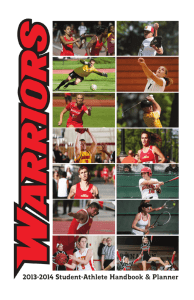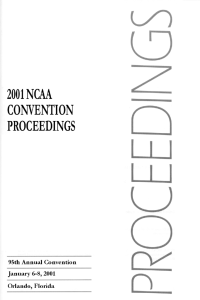The purpose of the Drug Education, Evaluation, Treatment, and
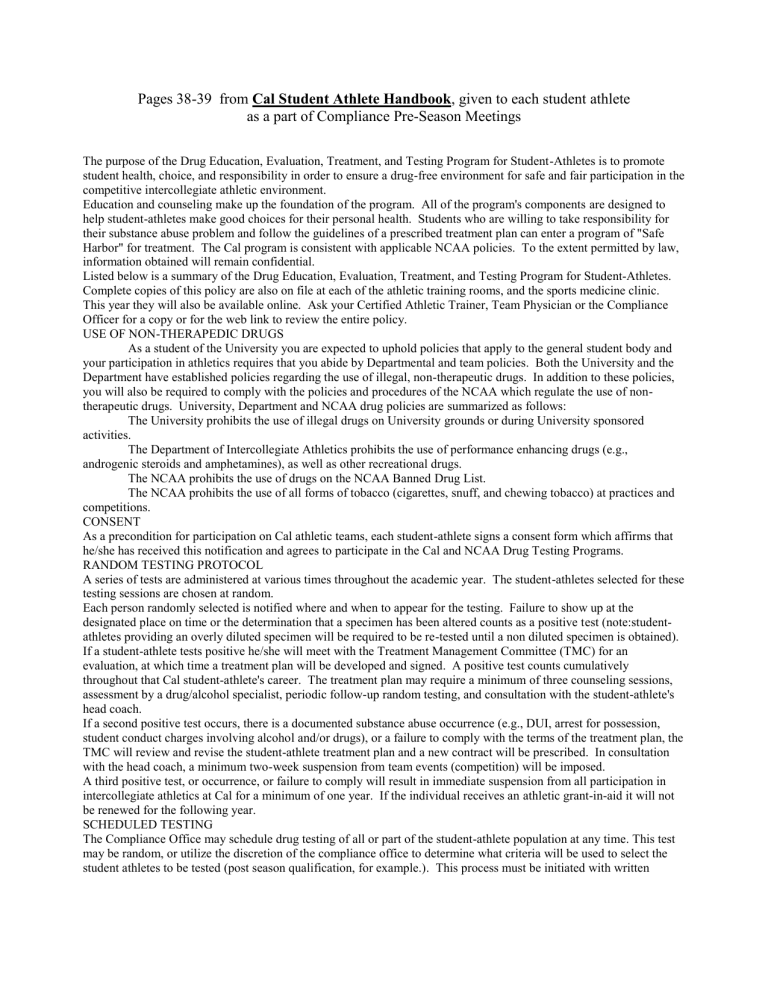
Pages 38-39 from Cal Student Athlete Handbook , given to each student athlete as a part of Compliance Pre-Season Meetings
The purpose of the Drug Education, Evaluation, Treatment, and Testing Program for Student-Athletes is to promote student health, choice, and responsibility in order to ensure a drug-free environment for safe and fair participation in the competitive intercollegiate athletic environment.
Education and counseling make up the foundation of the program. All of the program's components are designed to help student-athletes make good choices for their personal health. Students who are willing to take responsibility for their substance abuse problem and follow the guidelines of a prescribed treatment plan can enter a program of "Safe
Harbor" for treatment. The Cal program is consistent with applicable NCAA policies. To the extent permitted by law, information obtained will remain confidential.
Listed below is a summary of the Drug Education, Evaluation, Treatment, and Testing Program for Student-Athletes.
Complete copies of this policy are also on file at each of the athletic training rooms, and the sports medicine clinic.
This year they will also be available online. Ask your Certified Athletic Trainer, Team Physician or the Compliance
Officer for a copy or for the web link to review the entire policy.
USE OF NON-THERAPEDIC DRUGS
As a student of the University you are expected to uphold policies that apply to the general student body and your participation in athletics requires that you abide by Departmental and team policies. Both the University and the
Department have established policies regarding the use of illegal, non-therapeutic drugs. In addition to these policies, you will also be required to comply with the policies and procedures of the NCAA which regulate the use of nontherapeutic drugs. University, Department and NCAA drug policies are summarized as follows:
The University prohibits the use of illegal drugs on University grounds or during University sponsored activities.
The Department of Intercollegiate Athletics prohibits the use of performance enhancing drugs (e.g., androgenic steroids and amphetamines), as well as other recreational drugs.
The NCAA prohibits the use of drugs on the NCAA Banned Drug List.
The NCAA prohibits the use of all forms of tobacco (cigarettes, snuff, and chewing tobacco) at practices and competitions.
CONSENT
As a precondition for participation on Cal athletic teams, each student-athlete signs a consent form which affirms that he/she has received this notification and agrees to participate in the Cal and NCAA Drug Testing Programs.
RANDOM TESTING PROTOCOL
A series of tests are administered at various times throughout the academic year. The student-athletes selected for these testing sessions are chosen at random.
Each person randomly selected is notified where and when to appear for the testing. Failure to show up at the designated place on time or the determination that a specimen has been altered counts as a positive test (note:studentathletes providing an overly diluted specimen will be required to be re-tested until a non diluted specimen is obtained).
If a student-athlete tests positive he/she will meet with the Treatment Management Committee (TMC) for an evaluation, at which time a treatment plan will be developed and signed. A positive test counts cumulatively throughout that Cal student-athlete's career. The treatment plan may require a minimum of three counseling sessions, assessment by a drug/alcohol specialist, periodic follow-up random testing, and consultation with the student-athlete's head coach.
If a second positive test occurs, there is a documented substance abuse occurrence (e.g., DUI, arrest for possession, student conduct charges involving alcohol and/or drugs), or a failure to comply with the terms of the treatment plan, the
TMC will review and revise the student-athlete treatment plan and a new contract will be prescribed. In consultation with the head coach, a minimum two-week suspension from team events (competition) will be imposed.
A third positive test, or occurrence, or failure to comply will result in immediate suspension from all participation in intercollegiate athletics at Cal for a minimum of one year. If the individual receives an athletic grant-in-aid it will not be renewed for the following year.
SCHEDULED TESTING
The Compliance Office may schedule drug testing of all or part of the student-athlete population at any time. This test may be random, or utilize the discretion of the compliance office to determine what criteria will be used to select the student athletes to be tested (post season qualification, for example.). This process must be initiated with written
notification from the compliance office to the Head Athletic Trainer and/or Head Team Physician. (Note: studentathletes “enrolled” in Safe Harbor are exempt from the random selection process).
REASONABLE SUSPICION TESTING PROTOCOL
The student-athletes can also be subjected to evaluation by the TMC and to drug testing for "reasonable suspicion" upon referral by the team physicians, Director of Athletics or designee, coaching staff, athletic training staff, or other university personnel under the following circumstances:
Positive drug test by the NCAA
Documented substance use occurrence
Evidence of Drug use or Alcohol abuse is written up and presented to a student athlete by a staff member who has reason to believe that abuse is occurring from reliably reported or observed source.
Direct observation or observation from a reliable third party of specific behavior(s) that may pose an immediate threat to the health and safety of the student or other students and there is cause to believe that substance abuse/alcohol use is a factor. After evaluation by the TMC, a treatment plan that could include drug testing may be developed, and the procedures would then follow as stated above in the random testing protocol.
SAFE HARBOR
If a student-athlete wants to enter treatment for a substance abuse problem, the student-athlete can contact any member of the Treatment Management Committee for a confidential evaluation and treatment plan. This process is called
SAFE HARBOR. If, after the evaluation is completed, Safe Harbor is granted, the student will be expected to follow the plan and will be removed from the random selection list for the duration of the plan. (Note: Safe Harbor will not be given to student-athletes seeking only to avoid random selection in drug testing.) The student's coach and the athletic director will not be notified of his/her participation in Safe Harbor. Safe Harbor is a positive program for those desiring help with substance issues. Please read the policy carefully for more details.
APPEALS, AND REINSTATEMENT
All student-athletes are entitled to an appeal under terms of the Drug Education and Testing Program prior to the imposition of sanctions. A request for such hearing must be made to the Athletic Director as set forth in the complete description of the policy.
NCAA TESTING
Student-athletes may be tested while participating in championship and/or post-season events, or during a regularly scheduled on-site NCAA test. Individuals to be tested are selected from team NCAA squad lists. Failure to appear for an NCAA scheduled drug test, failure to provide a urine sample according to protocol, refusal to provide a urine sample, or any attempt to alter the urine sample will be treated as a positive test by the NCAA. Penalties include the loss of a minimum of one season of competition in all sports. Safe Harbor is not an option once a student-athlete has been selected for NCAA testing or university random drug testing, nor does Safe Harbor shield a student-athlete from selection by the NCAA for its drug testing program.
**The NCAA's drug testing program is a separate program from the University of California, Berkeley, Drug
Education and Testing Program.
Table 1,
Notification of Testing Results Reporting
Who Gets Notified:
Treatment Management Committee
Head Coach
Director of Athletics
Table 2,
Safe Positive
Harbor Test 1 Test 2 Test 3
X X
X
X
X
X
X
X
X
X
Procedures and Consequences
Procedures and Consequences:
Exemption from random testing
Evaluation by TMC
Treatment Plan w/ TMC
Safe Positive
Harbor Test 1 Test 2 Test 3
X
X
X
X
X
X
X
X
X
Minimum 2 week suspension from team(Mandatory)
Immediate suspension from all team functions(Mandatory)
X
X
Athletic grant-in-aid discontinued
(Mandatory) X
The policy outlined above is subject to departmental review and modification at any time. However, any changes made to the policy will be announced to all current student-athletes, coaches, and relevant staff prior to its implementation.
Notification of changes will come in written form to all head coaches and sport supervisors, and will be made available to all student-athletes.
The Drug and Alcohol Education, Evaluation, Treatment, and Testing Program for Student Athletes at the University of
California, Berkeley must be in accordance with the policy set forth by the University “code of student conduct” wherein the “unlawful” or “attempted manufacture, distribution, dispensing, possession, use or sale of controlled substance” and the “abuse of alcohol is prohibited and can result in sanctions and penalties” including “loss of privileges and exclusion from (participation in) activities.”
This policy is also consistent with applicable NCAA and conference regulations regarding “banned substances” and the consequences of their use.
Finally, this policy does not supersede any Federal, State or Local law, regulation or requirement regarding illegal drug possession, use or distribution, or any other laws applicable to the above policy.
